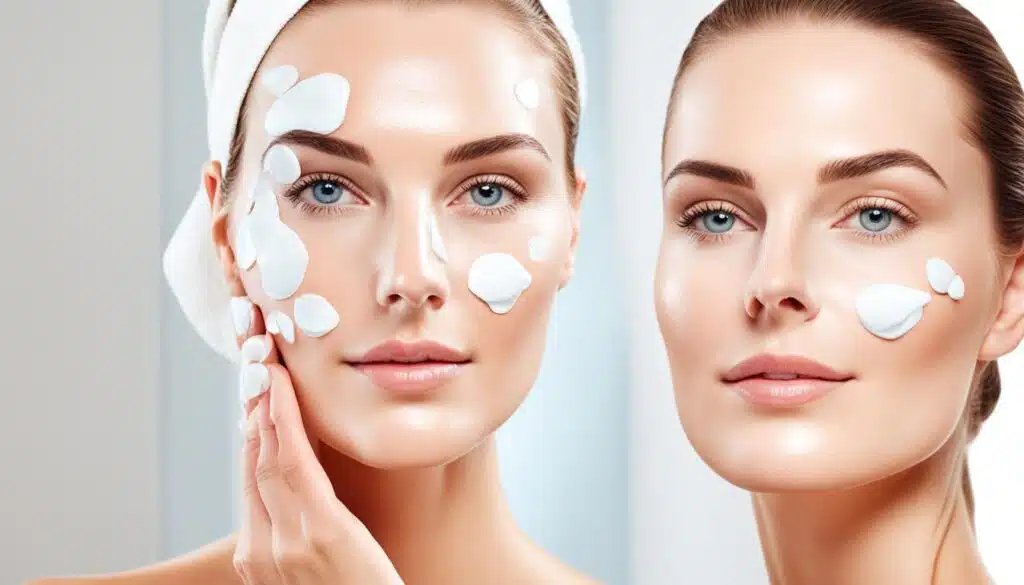Combination skin can be a challenge to care for because it requires addressing both oily and dry areas. Finding the right skincare routine is essential to keep your skin balanced, healthy, and looking its best. By following an optimal skincare routine for combination skin, you can effectively address specific concerns, maintain a clear complexion, and promote overall skin health.
Key Takeaways:
- Combination skin is characterized by having both oily and dry areas.
- Choosing the right skincare products that are suitable for combination skin is crucial.
- Gentle cleansing, hydration, and protection are essential steps in a skincare routine for combination skin.
- Treating specific skin concerns and protecting your skin from the sun are important for maintaining a healthy complexion.
- Weekly exfoliation and masking can provide additional benefits for combination skin.
- Understanding your skin type and individual needs is key to tailoring an effective skincare routine.
- Consistency and personalized care are vital for optimizing the health and appearance of combination skin.
Understanding Combination Skin
Combination skin is a common skin type that is characterized by having both oily and dry areas. The oily areas, typically found in the T-zone (forehead, nose, and chin), have larger pores and tend to be prone to acne and breakouts. The dry areas, often found on the cheeks and sometimes the jawline, may appear flaky or rough. Combination skin can be tricky to care for as it requires a delicate balance between hydrating the dry areas without overstimulating the oily areas. It is important to avoid products that can strip the skin of its natural oils or clog the pores, and instead, choose skincare products that are gentle and suitable for all skin types. Understanding your skin type is the first step in establishing an optimal skincare routine for combination skin.
| Characteristics of Combination Skin | Causes of Combination Skin |
|---|---|
|
|
People with combination skin often struggle to find the right skincare products and routine that effectively addresses their skin concerns. Combination skin can be sensitive, so it’s important to choose gentle products that won’t irritate or further imbalance the skin. Additionally, certain ingredients and habits should be avoided for combination skin. Harsh products and over-washing can strip the skin of its natural oils and cause dryness or overproduction of oil. It’s also important to protect the skin from harmful UV rays, as excessive sun exposure can damage the surface of the skin and cause premature aging.
Combination skin can be tricky to care for as it requires a delicate balance between hydrating the dry areas without overstimulating the oily areas.
Determining Your Skin Type
To determine your skin type, you can start by observing your skin’s behavior and characteristics. Take note of how your skin feels in different areas and at various times of the day. Notice if the T-zone tends to get oily while the cheeks feel dry. You can also consider taking a skin type quiz or consulting a dermatologist for a professional assessment. Understanding your skin type is crucial for creating an effective skincare routine that caters to your specific needs.
Understanding your skin type is the first step in establishing an optimal skincare routine for combination skin.
When caring for combination skin, it’s important to address its unique challenges and needs. By using products formulated for combination skin and adopting a targeted skincare routine, you can help balance and hydrate the different areas of your face. With proper care, your combination skin can look and feel its best, achieving a harmonious and healthy complexion.
Cleansing for Combination Skin
Cleansing is a crucial step in any skincare routine, especially for combination skin. The goal of cleansing is to remove dirt, excess oil, and impurities from the skin, while also balancing its moisture levels for a healthy and clean complexion.
When choosing a cleanser for combination skin, it is important to opt for a gentle formula that effectively cleanses the skin without stripping it of its natural oils or causing dryness. Look for a non-drying cleanser that is specifically formulated for the combination skin type.
To cleanse your skin effectively:
- Wet your face with warm water.
- Apply the cleanser to your face, massaging it in gentle circular motions to remove dirt, excess oil, and impurities.
- Rinse off the cleanser with lukewarm water.
- Pat your skin dry with a clean towel, avoiding harsh rubbing that can irritate the skin.
Avoid over-cleansing or using harsh cleansers, as this can strip the skin and disrupt its natural balance. Instead, opt for a gentle cleanser that effectively removes impurities while maintaining the skin’s moisture levels.
By incorporating proper cleansing techniques and a gentle cleanser into your skincare routine, you can effectively cleanse the skin, remove makeup, and maintain a balanced complexion for combination skin.
Moisturizing and Hydrating Combination Skin
Moisturizing and hydrating combination skin is vital to maintain a balanced and healthy complexion. To effectively nourish and moisturize your skin, it’s important to choose products that cater to both the dry and oily areas of your face. By incorporating lightweight moisturizers and hydrating ingredients, you can achieve optimal hydration without clogging pores or exacerbating oiliness.
For the dry areas of combination skin, opt for a moisturizer that provides deep hydration and restores moisture. Look for lightweight moisturizers that won’t weigh down your skin or cause excess oiliness in the T-zone. Hyaluronic acid and ceramides are moisturizing ingredients that can help lock in moisture and improve skin texture without clogging pores.
On the other hand, the oily areas of combination skin require a water-based moisturizer that provides hydration without adding excess oil. Look for an oil-free moisturizer with a light, non-greasy formula. This will ensure that your skin stays hydrated without feeling heavy or greasy throughout the day.
In addition to moisturizers, incorporating a hydrating serum into your skincare routine can provide an extra boost of moisture to both the dry and oily areas of your skin. Look for serums that contain hydrating ingredients like hyaluronic acid and ceramides to effectively nourish and balance your complexion.
By moisturizing and hydrating your combination skin, you can soothe and calm any dry patches while maintaining a balanced and nourished complexion. Remember to choose lightweight, water-based formulas for the oily areas and opt for moisturizers that contain hydrating ingredients to lock in moisture without clogging pores. By tailoring your skincare routine to your combination skin, you can achieve a healthy and radiant complexion.
| Hyaluronic Acid | Ceramides |
|---|---|
| Provides deep hydration | Locks in moisture |
| Improves skin texture | Strengthens the skin barrier |
| Lightweight and non-greasy | Nourishes and restores |
| Does not clog pores | Improves skin elasticity |
| Soothes and calms the skin | Reduces moisture loss |
Treating Specific Skin Concerns for Combination Skin
In addition to cleansing and moisturizing, treating specific skin concerns is an important part of a skincare routine for combination skin. Combination skin often presents with various concerns such as acne, blemishes, dark spots, hyperpigmentation, uneven skin tone, fine lines, wrinkles, dull skin, and congested pores. Treating these concerns requires targeted skincare products and ingredients that can address each issue effectively.
Treating Acne and Blemishes
Acne and blemishes are common concerns for combination skin. The key to treating acne is to keep the skin clean and balanced. Incorporating exfoliating acids, such as alpha hydroxy acids (AHAs) or beta hydroxy acids (BHAs), in your skincare routine can help unclog pores, control oil production, and reduce the occurrence of breakouts. Additionally, using skincare products with retinoids can promote cell turnover and prevent the formation of new blemishes.
Addressing Dark Spots and Hyperpigmentation
Dark spots and hyperpigmentation can be a result of acne scars or sun damage. To fade these spots and even out the skin tone, look for products containing brightening ingredients such as vitamin C and kojic acid. Vitamin C helps to brighten the skin and fade hyperpigmentation, while kojic acid inhibits the production of melanin, which causes dark spots.
Improving Skin Texture and Minimizing Fine Lines
Uneven skin texture and the appearance of fine lines are often concerns for combination skin. Incorporating exfoliating acids, like AHAs or BHAs, can help smooth rough texture and promote cell turnover, resulting in smoother and more refined skin. Additionally, using retinoids can stimulate collagen production and improve the appearance of fine lines and wrinkles.
Controlling Oil Production and Reducing the Appearance of Pores
Combination skin is characterized by an oily T-zone and enlarged pores. To control excess oil production and minimize the appearance of pores, consider using skincare products with mattifying ingredients such as salicylic acid. Salicylic acid helps to regulate oil production and exfoliates the skin, preventing clogged pores and reducing their size.
Repairing the Skin Barrier and Addressing Signs of Skin Aging
Combination skin can experience a compromised skin barrier, leading to increased sensitivity and signs of aging. To repair the skin barrier, look for products that contain ceramides and niacinamide. Ceramides help to strengthen the skin’s barrier function, while niacinamide helps to reduce inflammation and restore the skin’s natural moisture balance. Additionally, incorporating ingredients like retinoids and antioxidants can address signs of skin aging, promote collagen production, and protect the skin against damage caused by free radicals.
By incorporating targeted treatments into your skincare routine, you can effectively treat specific skin concerns and achieve a more balanced and radiant complexion. However, it is important to introduce new products gradually and patch test them to ensure compatibility with your skin type. If you have any severe or persistent skin concerns, it is advisable to consult with a dermatologist for further evaluation and guidance.
Protection from the Sun for Combination Skin
Protecting your skin from the sun is crucial for maintaining the health and appearance of combination skin. Regardless of your skin type, incorporating sun protection into your skincare routine is essential to minimize sun damage, premature signs of aging, and the risk of skin cancer.
One of the most effective ways to protect your skin is by using sunscreen. Choose a broad-spectrum sunscreen with at least SPF 30 to shield your skin from both UVA and UVB rays. A broad-spectrum sunscreen provides comprehensive protection that helps prevent sunburn, fine lines, wrinkles, and skin cancer.
Look for a lightweight formula that is non-greasy and won’t clog pores, especially in the oily areas of combination skin. Consider a sunscreen with a mattifying finish to help control shine in the T-zone.
When applying sunscreen, make sure to do so generously to your face and neck before sun exposure. It is recommended to reapply sunscreen every two hours, especially if you are spending extended time outdoors or are exposed to water or sweat.
Aside from wearing sunscreen, there are other sun protection measures you can take to safeguard your combination skin. Seek shade during the peak hours of sun intensity, usually between 10 a.m. and 4 p.m. Wear protective clothing, such as wide-brimmed hats and long-sleeved shirts, to cover exposed skin. Don’t forget to wear sunglasses to protect your eyes from harmful UV rays.
By prioritizing sun protection in your skincare routine, you can effectively guard your combination skin from harmful rays and maintain its health and integrity.
Weekly Exfoliation and Masking for Combination Skin
Incorporating weekly exfoliation and masking into your skincare routine can provide additional benefits for combination skin. Exfoliation is a crucial step in removing dead skin cells, clearing pores, and smoothing the skin’s texture. By weekly exfoliation, you can improve skin tone and achieve a more radiant complexion.
There are different options for exfoliating combination skin, including chemical exfoliants, physical exfoliants, and enzyme exfoliants. Chemical exfoliants, like alpha hydroxy acids (AHAs) and beta hydroxy acids (BHAs), work to resurface the skin and brighten the complexion. Physical exfoliants, such as facial scrubs or brushes, physically remove dead skin cells to reveal smoother skin. Enzyme exfoliants, derived from fruits, provide a gentler alternative for those with sensitive skin.
When it comes to masks, you can choose from a variety of options that address specific skin concerns. Resurfacing masks containing exfoliating acids can help smooth fine lines, wrinkles, and clarify the skin. Hydrating masks nourish the skin and provide deep hydration to dry areas, while moisturizing masks replenish moisture and promote a healthy complexion. Nourishing masks can assist in addressing various skin concerns.
Weekly exfoliation and masking are essential in a combination skincare routine. Exfoliation aids in removing dead skin cells and improving the skin’s texture, while masks provide targeted benefits to address specific concerns and nourish the skin.
To incorporate weekly exfoliation and masking into your routine, follow these steps:
- Choose a facial exfoliant that suits your skin type and preferences.
- Apply the exfoliant to clean, damp skin, focusing on areas prone to dryness or oiliness.
- Gently massage the exfoliant in circular motions, avoiding the delicate eye area.
- Rinse off the exfoliant with lukewarm water and pat your skin dry.
- Follow up with a facial mask that targets your specific skin concerns.
- Apply the mask evenly to your face, avoiding the eye and lip areas.
- Leave the mask on for the recommended time as per the product instructions.
- Rinse off the mask with water and pat your skin dry.
- Finish with your regular skincare routine, including toner, serum, moisturizer, and sunscreen.
By incorporating weekly exfoliation and masking into your routine, you can enhance the effectiveness of your skincare products and achieve a healthier and more vibrant complexion. Remember to choose exfoliants and masks that are suitable for your combination skin and always follow the instructions provided by the manufacturer.
Benefits of Weekly Exfoliation and Masking for Combination Skin
Weekly exfoliation and masking provide numerous benefits for combination skin:
- Removes dead skin cells: Exfoliation eliminates dead skin cells, promoting a smoother and brighter complexion.
- Clears pores: Exfoliation helps clear clogged pores, reducing the likelihood of breakouts and congestion on the skin.
- Improves skin texture: By removing dead skin cells and promoting skin cell turnover, exfoliation smooths the skin’s texture.
- Enhances skin tone: Exfoliation can help improve uneven skin tone and minimize the appearance of hyperpigmentation.
- Addresses specific concerns: Masks can target specific skin concerns, such as acne, dryness, or dullness, providing intensive treatment.
- Resurfaces the skin: Resurfacing masks containing exfoliating acids can help refine the skin’s surface, reducing the appearance of fine lines and wrinkles.
- Brightens the complexion: Certain masks, such as those infused with brightening ingredients, can help achieve a more radiant complexion.
- Smooths fine lines and wrinkles: Masks that focus on hydration and moisture can help plump the skin, smoothing the appearance of fine lines and wrinkles.
- Clarifies the skin: Masks with clarifying properties can help clarify the skin, minimizing the appearance of blemishes and promoting a clearer complexion.
By incorporating weekly exfoliation and masking into your skincare routine, you can enjoy these benefits and maintain a healthy and glowing complexion. Remember to choose exfoliants and masks that suit your skin type and address your specific concerns for optimal results.
Choosing the Right Skincare Products for Combination Skin
When it comes to caring for combination skin, choosing the right skincare products is crucial. Opting for products that are suitable for your specific skin type can help maintain a healthy and balanced complexion. Here are some essential factors to consider when selecting skincare products for combination skin:
Gentle and Non-Irritating
Combination skin can be sensitive, so it’s important to choose products that are gentle on the skin and non-irritating. Look for formulations that are specifically formulated for all skin types, as they are more likely to be suitable for your combination skin. Fragrance-free products are also a good choice, as they are less likely to cause irritation.
Oil-Free and Non-Comedogenic
To prevent clogged pores and breakouts, opt for oil-free and non-comedogenic products. These products are designed to minimize oiliness and prevent pore blockage, which can be beneficial for the oily areas of combination skin. They won’t weigh down the skin or exacerbate oiliness, helping to maintain a balanced complexion.
Hypoallergenic and Dermatologist-Tested
If you have sensitive skin, it’s important to choose hypoallergenic and dermatologist-tested products. These products have undergone rigorous testing to ensure they are safe and gentle for sensitive skin types. Dermatologist-tested products offer added reassurance that they have been evaluated by skincare professionals.
Avoid Harsh and Drying Ingredients
To avoid aggravating both the dry and oily areas of combination skin, it’s crucial to avoid products that contain harsh and drying ingredients. Ingredients such as alcohol and sulfates can strip the skin of its natural oils and lead to increased dryness or oiliness. Look for products that contain hydrating and soothing ingredients, such as hyaluronic acid, ceramides, and niacinamide.
Look for Lightweight Formulas
When selecting moisturizers, serums, and treatments, opt for lightweight formulas. These products won’t feel heavy on the skin or contribute to excess oiliness. Lightweight formulas are easily absorbed and won’t clog pores, making them ideal for combination skin. They provide the necessary hydration without weighing down the skin.
Targeted Treatments
Combination skin often has specific concerns, such as uneven texture or hyperpigmentation. Incorporating targeted treatments into your skincare routine can address these concerns effectively. Look for ingredients like exfoliating acids, retinoids, and vitamin C to help brighten the skin, improve texture, and fade hyperpigmentation. Targeted treatments can help balance the different areas of combination skin and promote a more even complexion.
Sunscreen Protection
Irrespective of your skin type, sun protection is crucial. Look for a broad-spectrum sunscreen with SPF 30 or higher to protect your skin from harmful UVA and UVB rays. It should be lightweight, non-greasy, and easily absorbed by the skin. Incorporating sunscreen into your daily skincare routine can help prevent sun damage, premature signs of aging, and protect the skin barrier.
By carefully selecting skincare products that are suitable for combination skin, you can effectively address its unique needs. Remember to prioritize gentle and non-irritating formulations, avoid harsh and drying ingredients, and look for lightweight formulas. Incorporate targeted treatments to address specific concerns, and don’t forget to protect your skin from the sun. By choosing the right skincare products, you can maintain a healthy and balanced complexion for your combination skin.
Skincare Routines for Combination Skin
Establishing a consistent skincare routine is key for taking care of combination skin. Every individual may have slightly different skincare needs, but there are some general guidelines to follow.
Morning Skincare Routine
- Start with a gentle facial cleanser to remove any residue from the previous night. This will help cleanse the skin without stripping it of its natural oils.
- Follow with a facial toner to balance the skin and prepare it for the rest of your skincare routine.
- Apply a hydrating serum to provide moisture to the skin. Look for serums that contain hydrating ingredients like hyaluronic acid.
- Choose a lightweight moisturizer suitable for all skin types. This will help keep the skin hydrated without adding excess oil to the T-zone.
- Don’t forget to apply an eye cream to the delicate skin around the eyes. Look for one that addresses specific concerns like dark circles or fine lines.
- Finish off your morning routine with a broad-spectrum sunscreen with at least SPF 30. This will protect the skin from harmful UV rays and prevent sun damage.
Evening Skincare Routine
- Start your evening routine with a double cleanse. Use a cleansing oil or balm to dissolve makeup, followed by a facial cleanser to thoroughly clean the skin.
- After cleansing, apply a treatment serum or moisturizer that addresses specific skin concerns. This can include products with exfoliating acids, retinoids, or vitamin C.
- Incorporate weekly exfoliation into your routine to remove dead skin cells and promote a smooth skin texture. Choose gentle exfoliants like alpha hydroxy acids (AHAs) or beta hydroxy acids (BHAs).
- Once a week, use a facial mask that targets your specific skin concerns. This can include masks that hydrate, purify, or brighten the skin.
- Before bed, apply a night cream or moisturizer to nourish and replenish the skin while you sleep.
- Don’t forget to apply an under eye cream to the delicate skin around the eyes to keep it hydrated and prevent fine lines.
By following a skincare routine tailored to your combination skin, you can effectively balance and care for your skin throughout the day.
Tips for an Effective Skincare Routine for Combination Skin
To make the most of your skincare routine for combination skin, consider the following tips:
- Know your skin type: Understanding your skin type is essential for developing an effective skincare routine. Determine whether you have combination skin, which exhibits both oily and dry areas.
- Understand your skin concerns: Take the time to identify specific skin concerns you want to address, such as acne, uneven skin tone, or dry patches.
- Choose gentle products: Opt for skincare products that are gentle on the skin and free from harsh ingredients. Look for formulations that are non-irritating, fragrance-free, and suitable for combination skin.
- Avoid over-washing: While it’s important to keep your skin clean, excessive washing can strip away natural oils and disrupt the skin’s balance. Limit cleansing to twice a day.
- Use lukewarm water: When cleansing your face, use lukewarm water instead of hot water. Hot water can strip the skin of its natural oils.
- Pat dry: After washing your face, gently pat it dry with a clean towel. Avoid rubbing, as this can irritate the skin.
- Don’t skip moisturizer: Even if you have oily areas, it’s important to moisturize your skin. Choose a lightweight, oil-free moisturizer that hydrates without adding excess oil.
- Exfoliate once per week: Regular exfoliation helps remove dead skin cells and unclog pores. Use a gentle exfoliant once a week to reveal smoother and brighter skin.
- Protect from the sun: Sun protection is crucial for all skin types. Apply sunscreen with a broad-spectrum SPF of at least 30 to protect your skin from harmful UV rays.
- Avoid excessive touching: Touching your face throughout the day can transfer oil and bacteria, leading to breakouts. Try to minimize touching your face as much as possible.
- Drink plenty of water: Hydrating your body from within can help keep your skin healthy and glowing. Aim to drink at least 8 glasses of water per day.
- Get enough sleep: Lack of sleep can contribute to skin issues such as dullness and breakouts. Aim for 7-8 hours of quality sleep each night to help your skin regenerate.
- Manage stress: Stress can negatively impact your skin’s health. Practice stress management techniques such as exercise, meditation, or deep breathing to promote overall well-being.
- Be consistent with your routine: Consistency is key in any skincare routine. Stick to your chosen products and follow your skincare routine daily to achieve the desired results.
The Importance of Tailored Skincare for Combination Skin
Combination skin requires a personalized approach to skincare in order to maintain a healthy and balanced complexion. With combination skin, individual needs vary, with some areas being oily and others dry. By tailoring your skincare routine to address your specific concerns, you can achieve the desired results for your combination skin type.
One of the key benefits of a tailored skincare routine is the ability to target specific concerns. Whether it’s oiliness in the T-zone, dry patches on the cheeks, or a combination of both, a personalized approach allows you to use targeted treatments to address these issues. Incorporating gentle yet effective products into your routine helps to balance oil production, hydrate dry areas, and prevent breakouts.
An optimized skincare routine for combination skin takes into account the need to maintain skin balance. This means using products that are gentle enough to not aggravate the skin, yet effective in delivering the desired results. Finding the right balance between hydration and oil control is crucial in achieving a healthy complexion.
A tailored skincare routine also helps to enhance overall skin health. By addressing specific concerns and ensuring that your skin stays balanced, you can prevent common issues associated with combination skin, such as breakouts and sensitivity. The use of targeted treatments, such as exfoliating acids, retinoids, and vitamin C, can enhance the texture and radiance of your skin.
To optimize your skincare routine for combination skin, it’s important to choose products that are gentle yet effective. Look for ingredients such as hyaluronic acid and ceramides that help to balance and hydrate the skin. Avoid harsh ingredients that can further disrupt the balance of your skin. Consistency is key in ensuring that your skincare routine delivers the desired results.
By tailoring your skincare routine to your individual needs and focusing on a gentle yet effective approach, you can achieve a healthy and radiant complexion. The key is to address specific concerns while maintaining the balance of your skin. With a well-optimized routine, tailored to your combination skin, you can enhance your overall skin health and achieve the results you desire.
| Benefits of Tailored Skincare for Combination Skin | How to Achieve Tailored Skincare |
|---|---|
|
|
Also Read: Best Skin Care For Oily Skin Tips
Conclusion
Establishing an optimal skincare routine for combination skin is crucial to achieve a balanced and nourished complexion. By focusing on gentle cleansing, effective treatments, hydration, and protection, you can address specific concerns and maintain a healthy and radiant complexion.
Starting with gentle cleansing, it is important to remove impurities without stripping the skin. Choose a cleanser specifically formulated for combination skin that will effectively remove dirt and oil while maintaining the skin’s natural moisture balance.
Next, incorporate effective treatments into your routine to address specific concerns such as acne or uneven skin tone. Look for ingredients like exfoliating acids, retinoids, or vitamin C that can brighten the skin, improve texture, and promote overall skin health.
Hydration and protection are key to maintaining combination skin. Use a lightweight moisturizer that nourishes the skin without clogging pores, and don’t forget to apply a broad-spectrum sunscreen with an SPF of at least 30 to protect against harmful UV rays.
Remember, a tailored approach is essential. Observe how your skin responds to different products and make adjustments as needed. By following a consistent skincare routine that works for your combination skin, you can achieve optimal results and maintain a healthy and balanced complexion.
FAQs
Q: What is combination skin?
A: Combination skin is a type of skin that is characterized by having both oily and dry areas. Usually, the T-zone (forehead, nose, and chin) is oily, while the cheeks are dry.
Q: What causes combination skin?
A: Combination skin can be caused by genetics, hormonal changes, or using the wrong skincare products that disrupt the skin’s natural balance.
Q: What is the best skincare routine for combination skin?
A: The best skincare routine for combination skin involves gentle cleansing, exfoliating, hydrating, and using products specifically targeted for combination skin.
Q: How to care for combination skin?
A: To care for combination skin, it’s important to use a gentle cleanser, lightweight moisturizer, and products that balance the skin without causing excess oiliness or dryness.
Q: How to avoid common pitfalls for combination skin?
A: Avoid using harsh products, overwashing your face, skipping moisturizer, and using heavy creams that can clog pores or strip the skin of its natural oils.
Q: What are the best skincare products for combination skin?
A: Look for products labeled for combination skin that are oil-free, non-comedogenic, and contain ingredients like hyaluronic acid, niacinamide, and salicylic acid to balance and nourish the skin.
Q: How to keep combination skin looking healthy and radiant?
A: To keep combination skin looking its best, focus on hydrating, protecting from UV rays, exfoliating regularly, and maintaining a consistent skincare routine tailored to your skin type.













